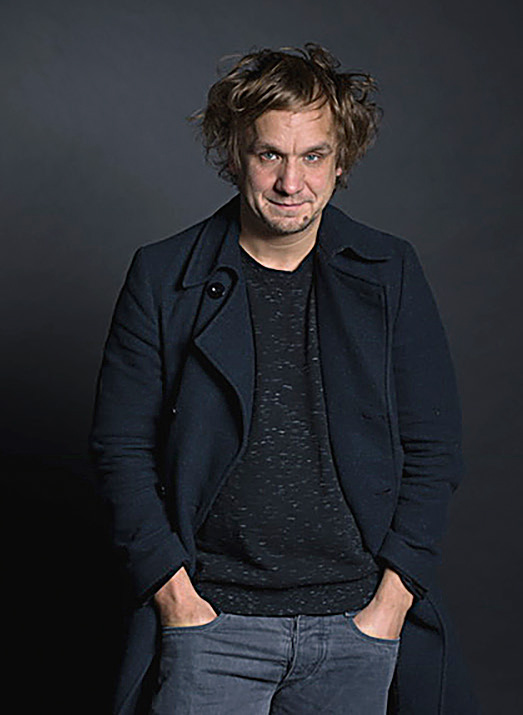Since this autumn, the exceptional director David Bösch has been teaching stage directing at the Max Reinhardt Seminar. A portrait.

David Bösch answers with poetry. And those who know this director’s productions will be unfazed by that. After all, it’s something one can clearly sense in his theatre. His legendary Romeo and Juliet production at the Burgtheater in 2011 featured the song “Consequence” by The Notwist played over and over again. Always the same, poetic sound. A bit kitschy and opulent and at the same time somehow quite reduced, propelled along by a constant, laid-back beat. Not to mention how the song is just so beautiful that one really does want to hear it again and again. Much like the band The Notwist, stage director Bösch has no fear of overdosing on emotion—for he likewise doesn’t shy away from conjuring up strong atmospheres and telling stories.
Even so, North Rhine-Westphalia-native Bösch never misses a chance for a gag, either. He plays tricks on stage and let’s theatre be theatre, with the particular box of tricks he employs geared towards really making something happen in the audience. Bösch also has no problem with occasionally turning his audience’s stomachs, for his theatre is not intended to produce indifference. A good example is his 2015 production of Werner Schwab’s potty-mouthed drama Die Präsidentinnen at the Akademietheater, with its thoroughly yucky stage. The scenery, created by Bösch’s long-time scenographer Patrick Bannwart, included a kitchen unit, a mattress, and a toilet (all of these completely grime-encrusted), and the crucifix on the wall was crowned by the words “Fuck Mother” spray-painted just above. It all couldn’t have been much more dismal, and it was fantastic that way.
For David Bösch, born in 1978, success came early. He studied theatre directing at what’s now the Zurich University of the Arts until 2004. Thereafter, things went fast. He won a number of prizes and immediately began receiving engagements at the major theatres. And since this autumn, Bösch has been teaching directing at the Max Reinhardt Seminar. He intends to structure his teaching much like driver training: with “theory and practice … and when you finish, you get your licence,” says Bösch, only to add with a mischievous twinkle in his eye: “Unfortunately, there’s no trial period.”
In his own university studies, Bösch found working with the acting students to be the most important thing: “Finding out ‘What do we want? What story do I want to tell? And how?’” Ideally, studies in directing should amount to the most realistic possible simulation of the working world that’s achievable within a protected and fear-free space, thinks Bösch. He does realise, however, that schools frequently fail to live up to this ideal. For first-time teacher Bösch, however, even this fact represents an opportunity: “Failing as a group is always better. And then you’ve learned something.”
Bösch says that a budding director needs to have individuality as well as trust in that which arises from within. “Directors are so diverse—as is theatre,” he says. “That which one person needs doesn’t matter at all to the next person. Which is just fine.” Speaking about what he finds important in terms of his own students, he thinks of his own productions, which sometimes have a touch of overblown dreams. Like when he says that endurance is important to him and goes on to talk about night-time hours in the rehearsal studio: “Those people who keep on rehearsing when their brains get close to the dream-state … reason almost drifts off to sleep, and that’s when things really start happening.” Ultimately, though, he’s concerned with “passing on knowledge or supposed knowledge” as well as “recognising and unleashing the potentials and peculiarities of future directing personalities.” Because to him, peculiarity is part and parcel of this profession.
What moves a person to become a director? Bösch answers this question with a poem of sorts: “Long ago / But / The curtain rises / All questions open / Curtain falls / Still / Even more / Which is probably good / In between: tears, sweat, crazies and the confused / Homburg, Käthchen, Ruprecht / And something that feels like me / Oh.” The young directing talent had his Viennese debut in 2009 with Dea Loher’s station drama Adam Geist, staged at the Akademietheater as a comic book fairy tale. Critical response was mixed. The director gained a surer foothold in Austria’s capital one year later with his production of Franz Xaver Kroetz’s Stallerhof—which was truly grandiose. He told this tough, realistic social drama about Beppi, the farmer Staller’s developmentally challenged daughter who gets pregnant by the old farmhand Sepp, as a crude romance. Or a dark fairy tale, with Beppi and Sepp ending up as the most impossible and beautiful stage couple in quite some time. In Bösch’s take on this play, feeble-mindedness regained its dignity. It was a radical and magnificently artful achievement. And ever since then, Bösch has been one of the Burgtheater’s directing regulars; currently playing is his meticulously and at times quite humorously staged production of Die Glasmenagerie by Tennessee Williams.
When Bösch speaks about his future teaching of young directors, one can clearly sense his love for the profession. His students will need to have respect, he says. “For the others. For themselves. For the job they’re doing. And not that overly much for their professor.”

